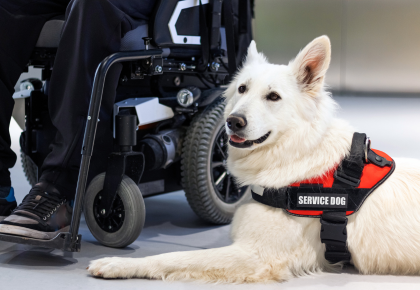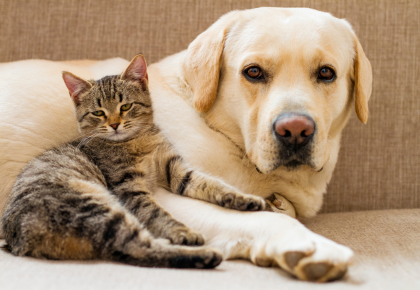Setting reasonable pet policies for your condo: What you need to know
 Most condo corporations aren’t just made up of human residents. You can often find a variety of four-legged residents as well! Furry friends can liven up a community and improve the mental health of residents. However, they can also lead to disagreements, messes, property damage and in rare cases, injury.
Most condo corporations aren’t just made up of human residents. You can often find a variety of four-legged residents as well! Furry friends can liven up a community and improve the mental health of residents. However, they can also lead to disagreements, messes, property damage and in rare cases, injury.
Figuring out how to make sure your human and pet residents can all live together in harmony is a challenge many condo boards face.
The best way to make this happen is by having pet policies. However, they need to be sensible and easy to follow. In this article we’ll breakdown what your condo board needs to consider when creating reasonable pet policies for the community.
Understand the difference between a pet and a service animal
 Ahead of making rules around pets, it’s important to understand the difference between a pet and a service animal. For the purposes of creating rules for your community, pets are defined as companion animals. Pets can provide emotional benefits to their owners, such as reducing stress or easing loneliness.
Ahead of making rules around pets, it’s important to understand the difference between a pet and a service animal. For the purposes of creating rules for your community, pets are defined as companion animals. Pets can provide emotional benefits to their owners, such as reducing stress or easing loneliness.
Service animals are working animals that assist people with disabilities and are not considered pets. In Ontario, one of two conditions must apply for an animal to be considered a service animal. To be classified as a service animal, said animal is wearing a vest or harness and is generally easily identifiable as relating to a disability, or the owner can provide documentation from a regulated health professional that confirms the animal’s status.
In Ontario the right to a service animal is protected by the Ontario’s Human Rights Code. You can learn more about service animals in the Accessibility for Ontarians with Disabilities Act (AODA).
Know the law
Throughout Ontario some municipalities have bylaws related to pets and animals so it’s important the rules you set for your condo align with those bylaws.
When creating or revising your community’s pet policies, work with your condo corporation’s legal counsel. This will help ensure all applicable laws and regulations, including those related to service, emotional support animals, and municipal bylaws are taken into consideration.
Your legal counsel will also be a big help in creating reasonable pet policies because they will be able to tell you what you can easily enforce and what you can’t.
Draft reasonable condo pet policies
According to a recent study conducted by the Canadian Animal Health Institute, approximately 60% of Canadian households own a pet. With that in mind, you can be almost certain you’ve got furry friends living in your community. Having solid rules in place will help pets and their owners remain good neighbours and not a nuisance.
Condo boards typical make pet rules around the following:
-
The number of pets permitted
-
Weight, size, or breed of animals
-
Areas where residents can keep or take pets
-
Requirements for where on the premises pets must be leashed
When considering these kinds of rules, it’s important to consider rules that serve an easy to define purpose and can be fairly enforced. For example, many condos want to put weight limits on animals to keep larger animals out of the community. However, rules specific to an animal’s weight can be hard to enforce. To ensure the rule is being followed, who is weighing all the pets in the community? What happens when a dog gains a few pounds from too many treats and ends up over the weight limit?
As you can see, setting weight limits is not the best way to go about keeping large animal breeds from moving in. In the event your board wants a rule about the specific types of animals and breeds that are allowed in the community, it’s easier to list what is and isn’t allowed. If you choose to set a rule about specific breeds, you should work closely with your legal counsel to craft it to ensure you aren’t setting something unrealistic.
An example of a more common rule a community could put in place would be to state that an animal’s owner must clean any waste deposited in common areas, and refusal to do so would result in a fine. To make this rule easier for residents to follow, you could consider placing dog waste disposal units that include a bag dispenser in the common outdoor areas that pets are allowed to use.
Not only does a rule like this show that your board is dedicated to keeping community grounds clean, but the addition of a pet amenity goes a long way in showing you consider pets a valuable part of your community. Which can be a real selling point for new residents.
Communication and compliance
Once you have drafted or updated your community’s pet rules, the next step is communicating them and ensuring residents comply.
 It’s important to communicate the rules to all residents, either to bring them up to speed or as reinforcement, so that all community members are compliant with the policies. The regulations should be communicated clearly and frequently to all residents, using as many communication channels as available, including email, newsletters and flyers posted in the community.
It’s important to communicate the rules to all residents, either to bring them up to speed or as reinforcement, so that all community members are compliant with the policies. The regulations should be communicated clearly and frequently to all residents, using as many communication channels as available, including email, newsletters and flyers posted in the community.
It's important to note that if your community has units that are rented out by the owner, they can have their own additional rules when it comes to pets. For that reason, within your communication it’s important to point out for tenants that the rules set by their landlord may differ than those set by the board. And they are required to follow their landlord’s rules in addition to the community’s rules.
Consistency and fairness in enforcing the rules will go a long way toward making sure all residents comply with them. When it comes to how complaint procedures are handled, you should work with your corporation’s legal counsel and your local animal control officials to ensure your process is on target.
Exceptions can be made sparingly
Any rules and regulations regarding animals should be written and consistently enforced for the well-being of the community, but there are some exceptions condo boards must consider, particularly when first instituting new rules about pets.
Let’s say after too many issues with pets your board has decided to become a no-pet community, but some residents already have existing pets. There is the option to “grandfather” them in so that the animals can remain with their families, and no one is forced from their homes. With this option, the updated rules must be well communicated to any new residents in order to avoid misunderstandings and exceptions to the rule.
Lean on your legal counsel and property management team
Like with the creation of any rules for your condo, there is a lot to consider when it comes to condo pet policies. However, because this is about resident’s furry family members, it’s often more complex and can be a sensitive issue for community members. That’s why it’s so important to work closely with your legal counsel when drafting the rules. They will help you create sensible rules that can be enforced, setting your community up for success.
And when it comes to communicating and enforcing the rules, it’s important you lean on the expertise of your property management team. They have the experience and tools to make communicating and enforcing the rules a breeze. Because reasonable pet policies can go a long way in keeping your human and four-legged residents happy.